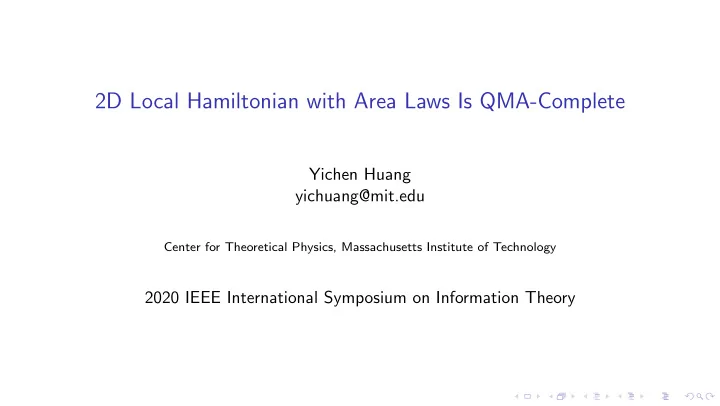

2D Local Hamiltonian with Area Laws Is QMA-Complete Yichen Huang yichuang@mit.edu Center for Theoretical Physics, Massachusetts Institute of Technology 2020 IEEE International Symposium on Information Theory
Outline Introduction and background: local Hamiltonian, QMA (Quantum Merlin-Arthur), classical representation of quantum states, area law. Main results: The 2D local Hamiltonian problem with the constraint that the ground state obeys area laws is QMA-complete. Implication: For ground states of 2D local Hamiltonians, (unless MA = QMA) area laws do not imply efficient tensor network representations that support efficient computation of local expectation values. Note that in 1D, an area law implies efficient matrix product state (MPS) representations.
Basic concepts Quantum many-body system: a system of many spins (qudits) Local Hamiltonian: Each term in the Hamiltonian acts on a constant number of spins Geometrically local Hamiltonian: Spins are arranged on a lattice. Each term in the Hamiltonian acts on a constant number of spins that are close to each other (e.g., nearest-neighbor interaction) Ground state: eigenstate of the Hamiltonian with the smallest eigenvalue Colloquially, a decision problem is in NP if verifying the solution in the yes-instance is in P. A decision problem is in MA if verifying the solution in the yes-instance is in BPP. A decision problem is in QMA if verifying the solution in the yes-instance is in BQP.
Complexity of the local Hamiltonian problem Local Hamiltonian problem: computing the ground-state energy of a local Hamiltonian The local Hamiltonian problem is in QMA because given the ground state, computing its energy is in BQP. The 5-local Hamiltonian problem is QMA-complete. 1 The local Hamiltonian problem is QMA-complete even in 1D with nearest-neighbor interactions. 2 The local Hamiltonian problem is QMA EXP -complete in 1D translation-invariant systems. 3 1 Kitaev, 1999. 2 Aharonov et al., FOCS, 2007. 3 Gottesman and Irani, FOCS, 2009.
Classical representation A generic state in quantum many-body systems is described by an exponential number of independent parameters. However, a large class of “physical” states (e.g., ground states of local Hamiltonians) appear to be highly non-generic. Some of them may allow efficient classical simulation. Trivial question: What class of ground states have efficient classical representations? Answer: All ground states of local Hamiltonians. Explanation: The local Hamiltonian itself is an efficient classical representation of its ground state as it is the sum of a polynomial number of terms.
Classical representation Less trivial question: Do all ground states of local Hamiltonians have efficient classical representations that support efficient computation of local expectation values? First “efficient” means polynomial space. Second “efficient” means polynomial time. Answer: No, unless MA = QMA. Explanation: Computing energy from such a representation is in BPP, implying that the problem is in MA. However, the local Hamiltonian problem is QMA-complete. Question: What class of ground states have efficient classical representations that support efficient computation of local expectation values?
Area law The entanglement between a subsystem L and its complement ¯ L is the boundary (area) O ( | ∂ L | ). L L Area laws are of great interest in quantum information, condensed matter and high energy physics.
Area law and efficient classical represnetation In 1D, an area law for entanglement implies efficient MPS representations. 4 Since computing local expectation values for MPS is in P, the 1D local Hamiltonian problem with the constraint that the ground state obeys an area law is in NP. Without an area law, the 1D local Hamiltonian problem is QMA-complete. 5 2D (and 3D) systems are much more exciting and challenging. Generalizations of MPS to higher dimensions are known as tensor network states. It is commonly believed that physical states with area laws have efficient tensor network representations . We rely on intuition to judge what is (more) physical. In particular, ground states of local Hamiltonians are more physical than generic quantum many-body states. 4 Verstraete and Cirac, PRB, 2006. 5 Aharonov et al., FOCS, 2007.
Previous results and motivation for our results In 2D quantum systems, there exist states (not necessarily ground states of local Hamiltonians) that obey area laws but do not have efficient classical representations, regardless of whether the classical representation supports efficient computation of local expectation values. 6 Proof idea: How large is the set of all states with area laws? A subset S can be explicitly constructed such that all states in S obey area laws and that S is parameterized by an exponential number of independent parameters. Since the set of all area-law states is too large, a generic area-law state cannot be approximately represented in polynomial space, and a generic area-law state is not an eigenstate of a local Hamiltonian. What if we restrict ourselves to ground states of local Hamiltonians? This class of states is more physical, but the counting approach above does not work in this context. 6 Ge and Eisert, NJP, 2016.
Main results, extensions, and implications The 2D local Hamiltonian problem with the constraint that the ground state obeys area laws is QMA-complete. The 2D translation-invariant local Hamiltonian problem with the constraint that the ground state obeys area laws is QMA EXP -complete. The 3D Heisenberg and Hubbard models with local magnetic fields and the constraint that the ground state obeys area laws are QMA-complete. Implication: Unless MA = QMA, not all ground states of 2D local Hamiltonians with area laws have efficient classical representations that support efficient computation of local expectation values.
Summary The local Hamiltonian problem is in MA if the ground state has an efficient classical representation that supports efficient computation of local expectation values. The 2D local Hamiltonian problem with the constraint that the ground state obeys area laws is QMA-complete. For ground states of 2D local Hamiltonians, (unless MA = QMA) area laws do not imply efficient tensor network representations that support efficient computation of local expectation values. Note that in 1D, an area law implies efficient matrix product state (MPS) representations, and reduces the complexity of the local Hamiltonian problem to NP.
Recommend
More recommend